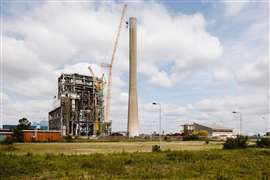Read this article in Français Deutsch Italiano Português Español
6 things we learned from Webuild’s annual results
20 March 2024
 Digital rendering of how ‘The Bow’ at Neom’s Trojena mountain destination will look (Image: Webuild)
Digital rendering of how ‘The Bow’ at Neom’s Trojena mountain destination will look (Image: Webuild)
Italy-based construction company Webuild last week revealed that it hit the €10 billion turnover mark in 2023.
The company, which renamed from Salini Impregilo in 2020, is sitting on a record order backlog of €64 billion (US$69.5 billion), having built itself up through acquisitions of companies such as US-based Lane Industries in 2015 and Australia’s Clough in 2023, to become a major international player in infrastructure projects.
Nearly two thirds (61%) of the group’s revenue comes from highways and rail works, with another 22% from hydro energy projects, while 14% comes from building projects and 3% from water.
Its experience in those areas helped it to score one of its most high-profile projects yet, following the end of its latest financial year (which ran to 31 December 2023), when it announced In January that it had won a US$4.7 billion deal to construction three dams to create a 2.8km-long freshwater lake at Trojena in Saudi Arabia’s Neom.
Here’s 6 things we learned from Webuild’s annual results:
1) Webuild to target bigger and more sophisticated US projects after Lane turnaround:
 Lane recently won a $299 million deal to widen the Seminole Expressway/SR 417 in Florida (Image: Webuild Group)
Lane recently won a $299 million deal to widen the Seminole Expressway/SR 417 in Florida (Image: Webuild Group)
Webuild (then Salini Impregilo) bought Connecticut-based highways contractor and asphalt producer Lane Industries in 2015 in a deal worth US$406 million.
It has been involved in “reshaping” the business since then. Webuild’s general manager of corporate and finance, Massimo Ferrari, told analysts, “We expect to reach break-even in 2024 and then to have positive marginality [in 2025].” He said Webuild hoped to Lane would expand into the Canadian market to pursue large infrastructure opportunities.
Webuild Group’s chief executive officer (CEO) Pietro Salini added that he wanted to see more growth from Lane in North America. “The size, which is a little bit shy of €1 billion, is not sufficient to take on what is our main strength, which is the larger and more sophisticated projects. Webuild will invest into people and we will bring in some of our best managers to take care of the US facility and look at different size projects in which our expertise is outstanding.”
Salini said he wanted to see Webuild grow to an annual turnover of €5 billion to €6 billion (US$5.4 billion to US$6.5 billion) over the coming years.
2) Work expected to start on world’s longest suspension bridge ‘in coming months’:
Webuild has long been in pole position to build what would be the world’s longest suspension bridge, spanning the Stretto di Messina between Sicily and the Italian mainland.
The Eurolink consortium led by Webuild won a bid to build the bridge back in 2005.
But the project has since been mired in delays and political wrangling, while the cost has risen to €13.5 billion.
Nonetheless, Italy’s new prime minister Giorgia Meloni backs the project and it now looks set to move forward.
Salini told investors last week that although Webuild Group’s order intake of €22 billion for 2023 did not include the Messina Strait bridge, he expected it to start shortly.
“We are awaiting approval for the final project in the coming months. The work will then be able to start immediately after approval,” he said. He called the project an “upside” to the company’s strategic plan. “Every day the start of the work comes nearer and nearer,” he added.
The bridge would have a central span of 3,300 metres, 60% longer than the current record holder, the 1915 Çanakkale Bridge in Turkey which has a central span of 2,023 meters. Meanwhile, the pylons holding the bridge up will be higher than the Shard tower in London, UK, measuring 382.6 meters (1,255 feet), making it also the world’s tallest suspension bridge.
3) Aim for 20% of managers to be female by 2025:
Webuild has set itself a target to increase the number of female managers to at least 20% by 2025. “On gender inclusion and diversity, our goal is to improve the gender mix of our topline management through inclusion-oriented processes and mentoring projects,” Salini said.
It is part of a wider training and recruitment initiative in the company, which plans to hire 10,000 people in Italy alone by 2026 in order to meet increased demand. Late last year, the business launched a new training programme called ‘Cantiere Lavoro Italia’ in southern Italy, which aims to offer recruits specialised training, employment, room and board. The business also logged one million training hours in 2023 for its workforce, 41% of whom are under the age of 35.
“We are committed to equip our people with the necessary skills and competences to become the leaders we need. We give them the space to become ready. We are convinced our future CEOS are already among our talent,” Salini said.
4) Australia is Webuild’s second-biggest market and growing:
 Webuild holds a major contract to build an extension to a network of hydro power stations in Australia’s Snowy Mountains (Image: Snowy Hydro Ltd.)
Webuild holds a major contract to build an extension to a network of hydro power stations in Australia’s Snowy Mountains (Image: Snowy Hydro Ltd.)
Following the completion of the acquisition of Clough in early 2023, Australia is now Webuild’s biggest market outside of Italy, accounting for 19% of its €64 billion order backlog (Italy accounts for 48%, while North America is on 5%, the rest of Europe on 8%, the Middle East on 6% and ‘other’ on 14%).
“Over the last two years, €2 billion of our revenues were generated in Australia. We expect this number to increase to over €3.5 billion in 2025,” Salini said. Operating with no debt and no claims against it, Clough is undertaking major projects including the A$5.1 billion (US$3.3 billion) Snowy 2.0 hydro project to expand a network of hydro power stations in the Snowy Mountains in New South Wales. It is also building the Western Sydney Airport Metro Line as the lead partner in a joint venture on a contract worth A$3.8 billion (US$2.5 billion).
Salini said, “Opportunity will be driven by investment in traditional segment, mainly road and rail in the short term with a higher boost in the medium term that will come from the energy sector. Powering Australia plan A$40 billion (US$26.1 billion) of investment in climate and energy transition. Clough can address new business segments where demand is growing on a global scale.”
5) Sale of more concessions on the cards:
Webuild Group undertakes concession activities mostly related to motorways, metros and car parks. Last year saw the sale of its concession on the Milan M4 Metro Line in Italy for €141 million (US$153.1 million). Webuild sold its stake in SPV Linea M4, the concessionaire company for the design, construction and operation of the 15km line, which is due to be delivered in full by the end of this year.
Ferrari said the company was potentially looking at selling other concessions, as was the case with the M4 Line. Other concessions for potential sale have a residual book value of €300 million.
6) Building scale key to Webuild’s strategy:
“Scale is fundamental in our industry,” Salini told investors. He highlighted the fact that the business has grown from 11,400 workers when it was the privately owned standalone business Salini Impregilo, to 87,000 workers in 2023 as the publicly listed Webuild Group. Over the same period, it increased revenue by more than four times, he said, “Scale has allowed us to invest in innovation and health and safety. It has made us a trusted partner for our clients to solve the most complex challenges in building strategic infrastructure,” he said.
“We have successfully managed the challenges that come from the dramatic changes into the environment in two years for instance the worker shortage and the supply chain bottlenecks. Scale has allowed us to invest in processes to successfully reduce risk and improve margins. This includes a more selective bidding process, successful contract management, a cost efficiency programme, efficiency working capital measures and the reorganization of our subsidiaries.”
|
STAY CONNECTED


Receive the information you need when you need it through our world-leading magazines, newsletters and daily briefings.
CONNECT WITH THE TEAM











